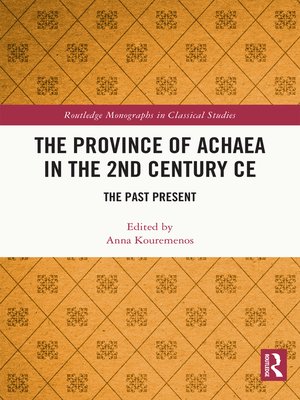The Province of Achaea in the 2nd Century CE
ebook ∣ The Past Present · Routledge Monographs in Classical Studies
By Anna Kouremenos

Sign up to save your library
With an OverDrive account, you can save your favorite libraries for at-a-glance information about availability. Find out more about OverDrive accounts.
Find this title in Libby, the library reading app by OverDrive.



Search for a digital library with this title
Title found at these libraries:
| Library Name | Distance |
|---|---|
| Loading... |
The Province of Achaea in the 2nd Century CE explores the conception and utilization of the Greek past in the Roman province of Achaea in the 2nd century CE, and the reception of the artistic, cultural, and intellectual outputs of this century in later periods.
Achaea, often defined by international scholars as "old Greece", was the only Roman province located entirely within the confines of the Modern Greek state. In many ways, Achaea in the 2nd century CE witnessed a second Golden Age, one based on collective historical nostalgia under Roman imperial protection and innovation. The papers in this volume are holistic in scope, with special emphasis on Roman imperial relations with the people of Achaea and their conceptualizations of their past. Material culture, monumental and domestic spaces, and artistic representations are discussed, as well as the literary output of individuals like Plutarch, Herodes Atticus, Aelius Aristides, and others. The debate over Roman influence in various Hellenic cities and the significance of collective historical nostalgia also feature in this volume, as does the utilization of Achaea's past in the Roman present within the wider empire. As this century has produced the highest percentage of archaeological and literary material from the Roman period in the province under consideration, the time is ripe to position it more firmly in the academic discourse of studies of the Roman Empire.
The Province of Achaea in the 2nd Century CE will appeal to scholars, students, and other individuals who are interested in the history, archaeology, art, and literature of the Graeco-Roman world and its reception.







